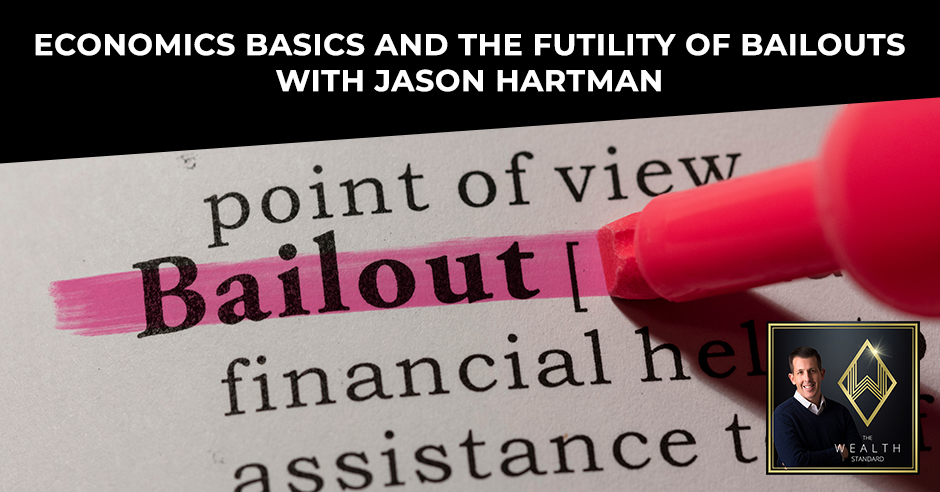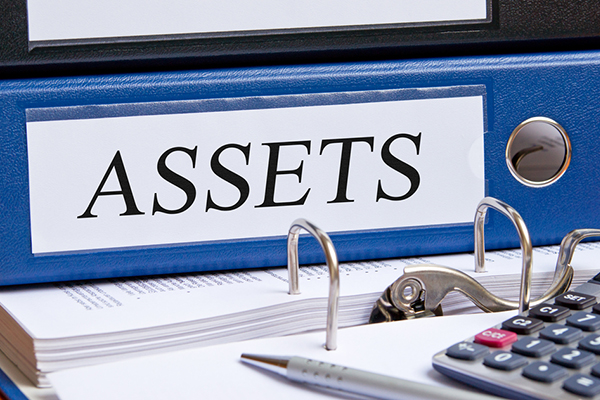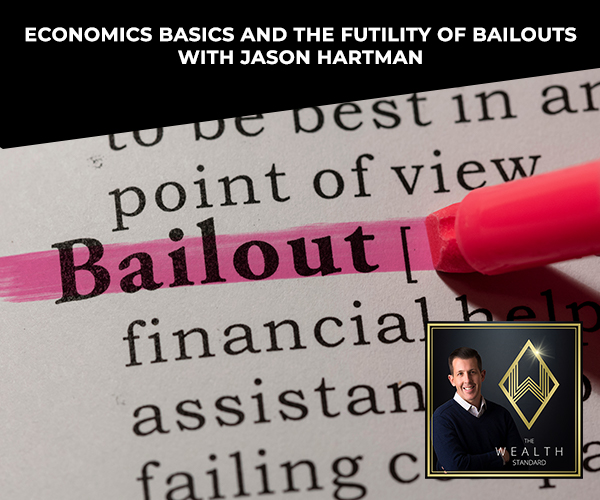Economics Basics And The Futility Of Bailouts With Jason Hartman
Podcast: Play in new window | Download

In the midst of an economic crisis that none of us has any control over, it would be interesting to know what the government is doing. Does bailing out companies really work? What things do we need to understand to make sense of this crisis? Jason Hartman, the Founder of the Platinum Properties Investor Network and host of The Creating Wealth Show, returns to the show with Patrick Donohoe for a short but insightful discussion of this issue. They go back to some of the basic principles of economics and reiterate the very nature of the economy and what really matters most in the creation of wealth – capital formation. Taking cues from the Austrian School of Economics, they argue that the failure of some businesses is a necessary, albeit painful, learning experience of how to provide a service, thus making bailouts not only unnecessary but counterproductive.
—
Watch the episode here:
Listen to the podcast here:
Economics Basics And The Futility Of Bailouts With Jason Hartman
Thanks for tuning into this part two with Jason Hartman. He is another one of those deep thinkers that helps me to check my assumptions and perspective. The episode that we did with Richard Duncan sparked a lot of comments and questions around what’s going on. This is something I’ll do in the next episode with Andy Tanner. We talk about what is the system that we are in right now, not what the system should be or what the Fed should be doing or what the government should be doing. It’s what they are doing because those things, we don’t have control over. When we operate our mindset and subsequently, our decision comes from that, with something that doesn’t exist, which is a hope. Oftentimes, we make the wrong decisions.
The more we understand about how the economy functions, how the short-term debt cycles and specifically long-term debt cycles, which is the monetary system, how they work, we can better understand where things are going. That’s where I talked about Ray Dalio’s How The Economic Machine Works. That’s important to understand. It’s a very well articulated video that helps us understand the system that we’re operating in, whether it’s good or bad, whether we think it should be another way or should be the way it is. It doesn’t matter. It’s the way that it is. That’s something that we can’t control, but we can control how we operate it and the decisions we make with our investments, with our money, with our wealth.
Jason and I start to get into it. It’s a perfect introduction to the next episode, which is going to be with Andy Tanner, where we dive even deeper. Thank you for your support. Thank you for visiting the website and subscribing to the newsletter. We’re trying to announce episodes and other things. Thank you for those who have taken advantage of some of the resources on TheWealthStandard.com. Jason and I mentioned a few things here that are notable. You can go over to YouTube and watch the video. Go to YouTube/thewealthstandard. You can subscribe there. Let’s get to my interview with Jason Hartman.
—

Bailing Out Companies: Our economy is in large part based on debt and consumption.
Patrick, it’s good to see you again.
Same here, Jason.
One of those listener questions you sent over was about the economy growing and shrinking and why that happens. We could talk about the business cycle or a variety of things, and then we have to ask ourselves, have the rules changed in an era of pandemics, riots, civil unrest? What do you think?
Money is ultimately debt. Click To TweetIt’s interesting that people are asking these questions. It’s because they’re more aware of what’s going on in society than they have been in the past. This is a question that you can spend days on. There are whole PhD programs on why this and why that as it relates to the economy. The long and short of it is the economy is the measurement of resources that are used for particular purposes. When an economy grows, that indicates that there is an increase in production, increase in value. In a nutshell, in easy terms, that’s why an economy grows in theory. Our economy is different than when those first economists started to define economies and then start to measure it.
Our economy is in large part based on debt and consumption. That’s where it gets complicated in a sense because most people think that money is value, but money is ultimately debt if you think about how money is created. It’s a different monetary system than the past. At the same time, the more you understand about that, the more questions you can ask because previous to COVID, the economy was growing at a small percentage. Also, what was growing was the expansion of credit and debt. That is what expanded the overall economic growth.

Bailing Out Companies: If you just continue to Band-Aid a wound, it will eventually get infected, and the person’s going to die.
We live in an economy that’s built on a house of cards essentially and money is created through debt and this crazy fractional reserve banking system we have. Both of us have studied that stuff a lot. If people don’t understand it, it’s obscure and it’s hard to get your head around. It’s so weird. We read books like Creature From Jekyll Island. We both know G. Edward Griffin. I’m sure you’ve interviewed him. I have him on my podcast several times. It’s hard to get your head around this stuff. Even if you think you get it, there’s another layer. You can keep peeling back the onion on this. I do think we’d be remiss if we didn’t talk about the good old-fashioned business cycle, and that’s largely an Austrian economic type of thing.
If there’s any economic school of thought that I most subscribed to, and I think you too, it’s the Austrian School. This is by no means an academic definition. It’s a man on the street view of it where they would say that the opposite of it would be John Maynard Keynes. The opposite of it would be Karl Marx who, as much as I don’t like him and don’t agree with him, I have to give him credit. He’s responsible for the deaths of hundreds of millions of people. I’m not giving him credit for that. I definitely do not like his ideas, but he is far and away the most influential economist in world history. He changed the world massively. The entire Soviet Union was based on his idea.
Sometimes you need contrast to understand the value of one system versus when it’s compared to something else.
The growth and the crash of economies is a dance between the rational and the irrational. Click To TweetI’m glad you pointed that out. That’s good. The Austrian School would say the way to create wealth is through capital formation and production. That’s the reality and it totally makes sense, but we don’t live in that world as you were alluding to. We don’t live in a world of reality. We live in a world of money being a super symbolic idea and an idea based on Fiat. We live in a world where Keynesianism has prevailed largely. It is the way it is. Going back to that Austrian School business cycle concept, they would say that the economy always acts in cycles. If you’re looking at a chart, there’s this cycle where it’s a boom time. There was expansion and more inventory of products and services created. They might even say inventory in the world of services. If we look at what happened during the shutdowns, when nobody could get a haircut, go to a nail salon, get a massage. Nobody could get a lot of stuff. Those are all services. Even services have an inventory in a sense because if those businesses go out of business, which many of them will or have already, there’s lower inventory.
We mostly think of inventory in terms of widgets. This is an economic widget. Inventories expand because manufacturing expands, credit expands. Everything’s going well and there’s a wealth effect and people feel good. That gets to a point where people start to wonder and they start to lose faith in the system. They think, “This can’t go on forever. Maybe we better save a little money for a rainy day. Maybe the sun won’t always be shining.” They start to rein in their horns a little bit. You see the stock market pull back. You see some bad days occur. You see the houses in your neighborhood aren’t selling for those crazy prices they once were selling for. You see it’s not quite as easy to get a raise at my job or to get a new job or to get that promotion or maybe my company laid a few people off, people’s search get a little bearish. That sets up for the next cycle, which is the bust.

Bailing Out Companies: The highest risk investment is when there’s peak euphoria, but the best time to invest is when there are greatest fear and despondency.
Those are great thoughts. If you think about it, the growth and the crash of economies is in large part the dance between the rational and the irrational. From a rational side of things, people are naturally wired to grow, first and foremost. They’re wired to either get the same for less or get more for the same. Meaning, the efficiency of phone and technology, you’re paying a little bit more, but look at how much more you’re getting compared to 5, 10 years ago. You get the same for less price. The Apple’s new C version of it is much less. At the same time, it still does a lot. In a nutshell, that’s the rational side of things.
Like you alluded to, Jason, you have the irrational side of things, which is emotion. A lot of times it drives behavior to one direction or another. When someone becomes afraid, they behave a certain way. When somebody is excited, they behave a certain way. There’s an investor curve as far as risk levels are concerned. The highest risk investment is when there’s peak euphoria. The best time to invest is when there’s the greatest fear and despondency of people.
Buy when there's blood in the streets and sell when everybody's partying. Click To TweetThe blood in the streets metaphor, buy when there’s blood in the streets and sell when everybody’s partying.
That’s a very Austrian way of looking at things, but I would say the thing that’s important to understand about the Austrian School of Economics is it’s based on freedom. There’s no government intervention. If somebody makes a bad choice, whether it’s starting a business or allocating capital to something and they fail, there are no bailouts. They have to fail. They go bankrupt. They go out of business. That’s necessary for the learning experience of how people provide a service, provide goods, to make sure that what their ideas in their mind is in demand in the economy. That’s what I love about the Austrian School.
It’s creative destruction.

Bailing Out Companies: Bailing out companies is not a capital investment.
We’re so afraid of failure. Failure is one of the greatest teachers especially in business. If you continue to Band-Aid something, the bone is eventually going to break. The wound is going to get infected and that person is going to die.
That’s a good point. I would put it maybe another way though. We all saw that with the bailouts in the Great Recession. A lot of people were upset about the bailouts and they artificially prevent what needs to happen. Those failures, those bankruptcies, those businesses going away needs to happen. When you don’t let it happen, when you interfere with the process, when the government comes in and bails them out, then you get this situation where you’re encouraging bad behavior.
If you want to create real wealth, you simply got to have capital formation. Click To TweetThere’s a moral hazard as they say. The greater economy in general become these zombie companies. The whole economy becomes this zombie economy. Think of it this way, when you wake up in the morning, the first thing millions of people do is they have a cup of coffee. I know it’s the first thing I do pretty much. You want to jumpstart your system and your system will naturally wake up. You don’t drink coffee, but I do and I didn’t use to. I had this girlfriend got me into Starbucks years ago. Ever since then I’ve been addicted, not to them but coffee in general. I need it, but you don’t need it.
You still wake up, but I need it as a crutch. My system has become used to it. After a while, like any form of addiction and caffeine is an addictive substance like many other things and behaviors like drugs and alcohol. That’s what we think of as addictions, like overeating or whatever. There are lots of little addictions we all engage in all the time, little addictive behaviors here and there, little compulsions. The nature of it is you always need more to get the same results. The same thing happens to zombie companies and zombie economies. The poster child of this would be Japan. They first have the last decade. They then have the last two decades and then going into the last three decades where their economy, no matter what you do, it can’t get to where it was. They have the highest debt to GDP ratio at about 230% of any developed country because they keep spending into it. After a while, it doesn’t work anymore.
Those debt levels continue to grow and so forth. I love one of your ten commandments of real estate investing because it alludes to using debt and using leverage as part of purchasing an asset. These days, people don’t use debt to purchase their assets and their savings. What it does is it goes against our economic system, which is fueled by debt. Debt is essentially priced into everything including real estates and cars. You look at what exists now, whether it’s the Japan economy or our economy. The growth of the economy in large part is due to credit expansion when there is stimulus.

Bailing Out Companies: We live in a world of credit-based assets, and when the credit dries up, things get tough.
That’s why the Federal Reserve in the United States has had to do constant quantitative easing and continue to expand because they have to grow. The reason why they have to grow is because there’s interest due on the debt and they need to pay the interest. It’s one of those things where they have to grow the economy so that there’s greater output, greater taxes, which then pays the debt. Richard Duncan, I’m not sure how much you studied him. He understands as well and not to say that it’s a good system. It’s an incredibly flawed system, but it’s the system that we have. As credit expands, things are most likely going to grow. As credit contracts, things are going to crash. Debt is like an accelerator. It’s like gasoline or jet fuel to a fire. It makes everything go quicker, faster, and worse.
The difference between using leverage to buy real estate versus a country or bailing out companies that shouldn’t be bailed out or spending on the welfare state, that isn’t a capital investment. Whereas the property you’re buying, as long as it’s a sensible property, is a capital investment. The bottom line is that the idea is if you want to create real wealth, you’ve simply got to have capital formation. The capital can come in the form of savings to invest or in terms of assets that produce income. That’s it. It’s that simple. You cannot spend on welfare programs or bailing out zombie companies to grow your economy. That’s not the way to spend your way out of it. It gets progressively more difficult. It requires more stimulus every time, more caffeine every time, that idea.
I’ll end with this, which is interesting when I realize this. Let’s say you have a government worker that is renting a home that you own. You’ve purchased it with leverage. You’ve purchased it the right way. They’re paying, but the way in which they’re paid is based on the government being able to have debt and be able to provide capital in the form of debt so that that person can get paid. It’s the same thing if a person works for a Fortune 500 company that is fueled in large part by corporate bonds, which they use to capitalize their company, work their company, and grow their company. That money is then used to pay this person who then pays the rent on your property. It’s the same thing with the suppliers of lumber and builders. A lot of that supply comes from being able to have access to debt, which allows them to produce. It’s interesting to see debt as this foundational thing or the dynamo that’s required these days in order for the economic machine to be working.
We live in a world of credit-based assets and when the credit dries up, things get tough and there’s another cycle right there. This is good stuff, Pat. Thanks for having this talk with me.
This was great. I love the conversation. We kept it as simple as we can.
Important Links:
- www.JasonHartman.com
- Richard Duncan – past episode
- How The Economic Machine Works – YouTube video
- YouTube/thewealthstandard
- Creature From Jekyll Island
About Jason Hartman
 Jason Hartman is the Founder of the Platinum Properties Investor Network and host of the Creating Wealth podcast, which is heard in more than 180 countries. Jason is a genuine self-made multi-millionaire and serial entrepreneur who owns 21 businesses in investing, financing, real estate development, and SaaS software. He has owned properties in 11 states, had hundreds of tenants, and been involved in several thousand real estate transactions. He has visited 83 countries, enjoys adventure, fitness, and lifelong learning.
Jason Hartman is the Founder of the Platinum Properties Investor Network and host of the Creating Wealth podcast, which is heard in more than 180 countries. Jason is a genuine self-made multi-millionaire and serial entrepreneur who owns 21 businesses in investing, financing, real estate development, and SaaS software. He has owned properties in 11 states, had hundreds of tenants, and been involved in several thousand real estate transactions. He has visited 83 countries, enjoys adventure, fitness, and lifelong learning.
Jason Hartman is the host of 23 podcasts with listeners in 189 countries, over 15,000,000 downloads, and over 5,000 episodes where he shares powerful strategies for business, investing and living the good life. Check out his podcasts and resources at www.JasonHartman.com or www.HartmanMedia.com Available on iTunes and your favorite podcast platforms.
Love the show? Subscribe, rate, review, and share!
















